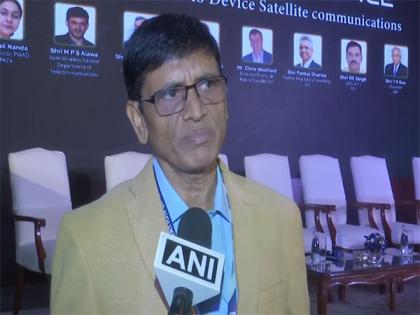Enterprise demand to drive satellite internet; space startups gaining ground in India: Department of Telecommunications (DoT) Advisor
By ANI | Updated: July 25, 2025 19:39 IST2025-07-25T19:33:05+5:302025-07-25T19:39:28+5:30
New Delhi [India], July 25 : Gulab Chand, Joint Wireless Advisor at Department of Telecommunications (DoT), is of the ...

Enterprise demand to drive satellite internet; space startups gaining ground in India: Department of Telecommunications (DoT) Advisor
New Delhi [India], July 25 : Gulab Chand, Joint Wireless Advisor at Department of Telecommunications (DoT), is of the view that satellite internet services will largely be of use for enterprises, and individuals are likely to continue using their 4G and 5G services.
"I hardly find, at the personal level, any adoption of the satellite internet by the individuals. But at the enterprise level, I think satellite kind of technology would be picked up by the enterprises," Chand toldon the sidelines of the 2nd IAFI Space Policy Conference.
He sees enterprises using satellite internet for logistics support, monitoring of various assets, including mobile assets.
"I think it will find good use," he supplemented.
"Satellite internet basically (in) India is like almost covered by the terrestrial...everyone possesses one or two mobile (phones) with them, so almost 5G footprint is everywhere and 4G is almost covered in all the village level," he noted.
Speaking about startups in the space sector, he said that startups are already manufacturing space goods.
"Certain companies are working for making the satellite payloads, etc. Already that is happening and a lot of assistance is also being provided by the government," he said. "Startups have already started thinking in that line. They have started manufacturing parts of the satellite system, If not the entire satellite. They are starting with panels and certain parts of the satellite. So I think, things are going to get brighter in the future," Chand noted.
In India, the space sector was liberalised in 2020, and the private sector was allowed to carry out end-to-end space activities. Indian National Space Promotion and Authorisation Centre (IN-SPACe) was created in the Department of Space for promoting, authorising and overseeing the activities of Non-Government Entities (NGEs) in the space sector.
The number of Space Start-Ups in India has gone up, from just 1 in 2014 to around 266 as of the end of 2024, government data showed.
The aim was to open up the space sector, which was, hitherto, a closed sector, when only the government was operating in space.
"So it's a big step taken forward," he said.
Bharat Bhatia, President of the ITU-APT Foundation of India (IAFI), speaking to ANI, said this two-day space policy conference has been one of the most successful events.
"The sessions were very detailed and very elaborate. We went through a session on D2D today, then on the 2nd day. And very intensively discussed all aspects of spectrum policy, regulation, market demand, all aspects of D2D have been discussed in a very detailed panel, with the participants from the government, from the industry, from the satellite operators, from the chip operators, and I believe this today conference itself has been one of the very successful events," Bhatia said.
"Our aim is to bring all the stakeholders on one platform, make sure that there is a continuous dialogue between the policymakers and between the industry, between the operators, between the chip vendors, between the ecosystem. So the whole idea of this conference is to get everybody on the same platform. Thrash out whatever the issues are there and make sure that India moves forward. The session, the last session that we had today on the Viksit Bharat, that session really provided a way forward. How do we make India a developed country by 2047, and that particular session really stole the thunder, because we are trying to use the satellite technologies to make India a developed country," he further said.
According to IAFI website, it is working for last 20 years with the prime objective of encouraging involvement of professionals, corporate, public and private sector industries, R&D organizations, academic institutions, and such other agencies engaged in development of ICT sector, in the activities of the International Telecommunication Union (ITU) and the Asia Pacific Telecommunity (APT).
On Day 1 of the conference, Thursday, Bharat Bhatia had applauded the opening up of the Indian space sector, adding that it holds immense potential for job creation and new investments.
"India has opened up the space to the private sector and the way the policy has evolved, it is going to bring in a lot of new jobs, a lot of new investment," Bhatia had said.
Disclaimer: This post has been auto-published from an agency feed without any modifications to the text and has not been reviewed by an editor
Open in app